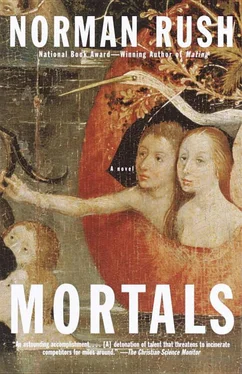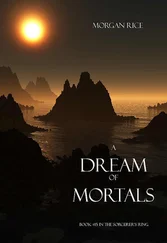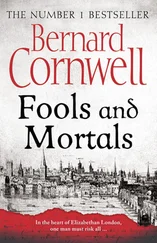Apparently Kerekang had a bottomless supply of dagga cigarettes. He was lighting up yet another one, murmuring that they were useful, the smoke was useful against dimonang, which meant mosquitoes. And the mosquitoes just at that moment were annoyingly active. It was better when there was any sort of breeze and worse when the air was still. Ray was tired of brushing at the mosquitoes, waving his hands around maniacally when the surges came. The clouds of dagga smoke did seem to discourage the mosquitoes. Ray felt a rush of temptation. Kerekang was in a state of elevation. He was speaking freely. If Ray joined him in this indulgence it might be helpful in reaching him on a certain level and convincing him it was time to save himself, to leave the scene and leave Botswana and save himself for a new life elsewhere, like someone else he could name. He was getting a more than ample sample, so to speak, of the perfume from the garden of delights Kerekang was inside. In a minute Kerekang would start mentioning pleasant things that were not relevant to the present completely fucked and unraveling situation. He would say that something was beautiful, something that really wasn’t beautiful or that if it was didn’t matter. You are psychic, Ray said to himself, because Kerekang was just then saying something about the earth being beautiful.
I would love to see beauty everywhere, too, Ray thought. He would like it even briefly but it was not what he needed.
Iris, her image in his heart or wherever it was, his mind, was helping him. Because it was Iris who had saved him from the deadly synergy of getting people to drink, in his official capacity, so that they would let relevant things out, and he had used the occasions to get drunk himself, which was a thing that had led to the downfall of more than one agency character, agents and officers and top dogs and not excluding Marion Resnick. But she had rescued him and had convinced him that he could do the sordid, not to mince words, the sordid socializing he had to do without being in bondage to alcohol, and he had succeeded, despite temptations that had come up. And because of that he would live longer than he would have, and in addition to giving up drinking there was the contribution to a longer and lonelier old age he had to thank her for via his giving up tobacco.
Ray had himself in hand. It was the image of his wife, his beloved, reminding him that it was important for him to be able to say truthfully that he hadn’t used drugs if the question appeared on an application for a job in the new life that was en route to him in an age when you could be asked to take a lie detector test as routinely as you could be asked to urinate in a Dixie cup for whatever anyone wanted to know. How long the image of his beloved would burn usefully bright was something he would have to wait to find out, in the years to come. Because the truth was that it was going to fade, he could expect it to fade, because everything fades. It wasn’t her fault.
Ray said, “You know what I think, rra, I think you have to get away to South Africa. Here in this country you are always going to be Setime, the fire-thrower, and you’ll be hunted down by Domkrag. They know who you are. Listen to me. This will not be forgiven. Mandela is coming to power soon in South Africa and it is going to be a new day. It’s coming, and you could be safe there …”
“They’ll kill him first.”
“No. His time has come. They won’t.”
“They say it was you Americans who whispered to the Boers where to find him.”
“Yes, it was my agency, I know that … rra, I’m changing my life. I think I may be going to South Africa. It’s going to be a new time, and rra, I have contacts there. I mean education people, not agency contacts. I have an idea for a school. But I do have agency contacts that could help you, people who know me from the life I’m leaving. Like I’m leaving my wife.” Ray’s voice buckled. He fabricated a coughing fit. He thought, I’m expressing myself poorly.
He had to be able to say it evenly because it was going to come up and come up. He said, “Yes, I’ll be leaving my wife. That’s part of it.”
“I am sorry, rra. Truly.”
“Nothing can be done.”
What he wanted to express to Kerekang was that they could join together, he and Kerekang, leaving everything behind and doing their lives differently forever at the same time. It was notional, no doubt about it. And it was the movies. It had the feeling of the movies about it, which ought to be a warning to him about how seriously he should be taking this idea. But he was in the grip of it. He liked, in fact loved, the idea of taking his tradecraft and using it contrarily, using it to get papers or passports or whatever was needed to get Kerekang launched and circumstanced away from the mayhem and murder he was drowning in. Of course he was thinking ten or twelve steps ahead of where they were now, silent upon a peak in not Darien but Pieter’s Knob and gazing out not at the Pacific Ocean but at the inscrutable sea of life they were going to put their canoes into, a different sea.
And then there was the question of whether Kerekang was going to feel he had any reason to believe Ray was genuine in his declaration of independence from the agency and the life he’d led, the entire life. Because it could so obviously be a maneuver, a ruse, a charade designed to conceal some underlying purpose of the agency, like sticking to Kerekang like a leech and finding out everything that would turn up about him and his associates everywhere. His warrant with Kerekang was what had been done to him at Ngami Bird Lodge and then what he had done on the roof of the building, insanely. Of course once you began asking questions there was no end in sight. For example how could he form a trusting partnership with anyone who believed him so easily when he said he was transforming himself so absolutely yet so abruptly? Your questions are non sequiturs, one non sequitur following another, he thought. He was paralyzing himself with questions.
On impulse Ray reached out and seized Kerekang’s wrist, and then his hand.
He said, “This is serious, what I’m saying. I want you to think. Stop smoking dagga, why don’t you. You’ve had plenty.”
Kerekang seemed surprised but not annoyed.
He said, “That’s right.” He spat out the burning cigarette. There was something almost jaunty or jocular about the way he did it. That’s the marijuana showing. It made people compliant with whatever was going on. Ray didn’t want Kerekang to come around to this view because he was being helped there by the dagga. No, what he wanted was for Kerekang to come around because he had spoken to him from his heart, there was no other phrase for it, spoken from his heart to the man Kerekang, and had been understood, had been received man to man, Ray speaking from his situation, dying animal to dying animal, he couldn’t express it exactly.
Kerekang was being agreeable. He was standing up and stretching.
“I had a wife, as well,” Kerekang said.
“Ah. You did?” Ray was surprised. This was a lacuna. There had been nothing in Kerekang’s dossier to suggest it.
“You were married?”
“Nyah, she was waiting for me, to marry. She was my betrothed.”
“And what happened?”
“Well, perhaps you can tell me, because she surprised me after six years when I was abroad, studying, as we agreed I should do, while she worked in Gaborone.”
“What do you mean?”
“Rra, I had one more year to be in Scotland. We were writing, we were telephoning. I had home visits, and they were just what you would hope. All the time I was abroad I was sending her poetry, this and that.”
“So you had no sign?”
“Nyah, not one, rra.”
Ray was amused that the agency had missed this information. It was an example of how defective the apparatus he was leaving was, how incompetent in so many ways.
Читать дальше












